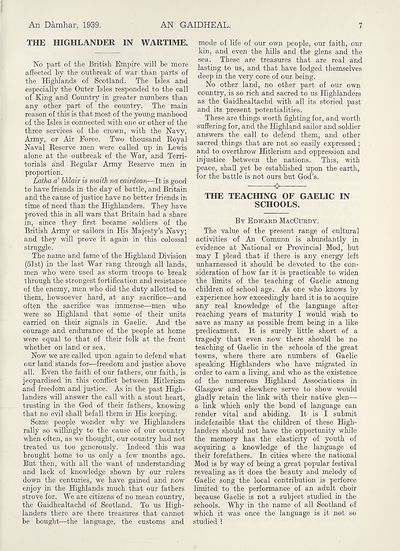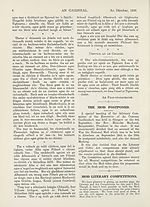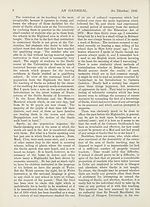Download files
Complete book:
Individual page:
Thumbnail gallery: Grid view | List view

An Damhar, 1939. AN GAIDHEAL. 7
THE HIGHLANDER IN WARTIME.
No part of the British Empire will be more
affected by the outbreak of war than parts of
the Highlands of Scotland. The Isles and
especially the Outer Isles responded to the call
of King and Country in greater numbers than
any other part of the country. The main
reason of this is that most of the young manhood
of the Isles is connected with one or other of the
three services of the crown, with the Navy,
Army, or Air Force. Two thousand Royal
Naval Reserve men were called up in Lewis
alone at the outbreak of the War, and Terri¬
torials and Regular Army Reserve men in
proportion.
Latha a’ bhlair is maiih na cairdean—It is good
to have friends in the day of battle, and Britain
and the cause of justice have no better friends in
time of need than the Highlanders. They have
proved this in all wars that Britain had a share
in, since they first became soldiers of the
British Army or sailors in His Majesty’s Navy;
and they will prove it again in this colossal
struggle.
The name and fame of the Highland Division
(51st) in the last War rang through all lands,
men who were used as storm troops to break
through the strongest fortification and resistance
of the enemy, men who did the duty allotted to
them, howsoever hard, at any sacrifice—and
often the sacrifice was immense—men who
were so Highland that some of their units
carried on their signals in Gaelic. And the
courage and endurance of the people at home
were equal to that of their folk at the front
whether on land or sea.
Now we are called upon again to defend what
our land stands for—freedom and justice above
all. Even the faith of our fathers, our faith, is
jeopardised in this conflict between Hitlerism
and freedom and justice. As in the past High¬
landers will answer the call with a stout heart,
trusting in the God of their fathers, knowing
that no evil shall befall them in His keeping.
Some people wonder why we Highlanders
rally so willingly to the cause of our country
when often, as we thought, our country had not
treated us too generously. Indeed this was
brought home to us only a few months ago.
But then, with all the want of understanding
and lack of knowledge shown by our rulers
down the centuries, we have gained and now
enjoy in the Highlands much that our fathers
strove for. We are citizens of no mean country,
the Gaidhealtachd of Scotland. To us High¬
landers there are there treasures that cannot
be bought—the language, the customs and
mode of life of our own people, our faith, our
kin, and even the hills and the glens and the
sea. These are treasures that are real and
lasting to us, and that have lodged themselves
deep in the very core of our being.
No other land, no other part of our own
country, is so rich and sacred to us Highlanders
as the Gaidhealtachd with all its storied past
and its present potentialities.
These are things worth fighting for, and worth
suffering for, and the Highland sailor and soldier
answers the call to defend them, and other
sacred things that are not so easily expressed;
and to overthrow Hitlerism and oppression and
injustice between the nations. This, with
peace, shall yet be established upon the earth,
for the battle is not ours but God’s.
0
THE TEACHING OF GAELIC IN
SCHOOLS.
By Edward MacCurdy.
The value of the present range of cultural
activities of An Comunn is abundantly in
evidence at National or Provincial Mod, but
may I plead that if there is any energy left
unharnessed it should be devoted to the con¬
sideration of how far it is practicable to widen
the limits of the teaching of Gaelic among
children of school age. As one who knows by
experience how exceedingly hard it is to acquire
any real knowledge of the language after
reaching years of maturity I would wish to
save as many as possible from being in a like
predicament. It is surely little short of a
tragedy that even now there should be no
teaching of Gaelic in the schools of the great
towns, where there are numbers of Gaelic
speaking Highlanders who have migrated in
order to earn a living, and who as the existence
of the numerous Highland Associations in
Glasgow and elsewhere serve to show would
gladly retain the link with their native glen—
a link which only the bond of language can
render vital and abiding. It is I submit
indefensible that the children of these High¬
landers should not have the opportunity while
the memory has the elasticity of youth of
acquiring a knowledge of the language of
their forefathers. In cities where the national
Mod is by way of being a great popular festival
revealing as it does the beauty and melody of
Gaelic song the local contribution is perforce
limited to the performance of an adult choir
because Gaelic is not a subject studied in the
schools. Why in the name of all Scotland of
which it was once the language is it not so
studied ?
THE HIGHLANDER IN WARTIME.
No part of the British Empire will be more
affected by the outbreak of war than parts of
the Highlands of Scotland. The Isles and
especially the Outer Isles responded to the call
of King and Country in greater numbers than
any other part of the country. The main
reason of this is that most of the young manhood
of the Isles is connected with one or other of the
three services of the crown, with the Navy,
Army, or Air Force. Two thousand Royal
Naval Reserve men were called up in Lewis
alone at the outbreak of the War, and Terri¬
torials and Regular Army Reserve men in
proportion.
Latha a’ bhlair is maiih na cairdean—It is good
to have friends in the day of battle, and Britain
and the cause of justice have no better friends in
time of need than the Highlanders. They have
proved this in all wars that Britain had a share
in, since they first became soldiers of the
British Army or sailors in His Majesty’s Navy;
and they will prove it again in this colossal
struggle.
The name and fame of the Highland Division
(51st) in the last War rang through all lands,
men who were used as storm troops to break
through the strongest fortification and resistance
of the enemy, men who did the duty allotted to
them, howsoever hard, at any sacrifice—and
often the sacrifice was immense—men who
were so Highland that some of their units
carried on their signals in Gaelic. And the
courage and endurance of the people at home
were equal to that of their folk at the front
whether on land or sea.
Now we are called upon again to defend what
our land stands for—freedom and justice above
all. Even the faith of our fathers, our faith, is
jeopardised in this conflict between Hitlerism
and freedom and justice. As in the past High¬
landers will answer the call with a stout heart,
trusting in the God of their fathers, knowing
that no evil shall befall them in His keeping.
Some people wonder why we Highlanders
rally so willingly to the cause of our country
when often, as we thought, our country had not
treated us too generously. Indeed this was
brought home to us only a few months ago.
But then, with all the want of understanding
and lack of knowledge shown by our rulers
down the centuries, we have gained and now
enjoy in the Highlands much that our fathers
strove for. We are citizens of no mean country,
the Gaidhealtachd of Scotland. To us High¬
landers there are there treasures that cannot
be bought—the language, the customs and
mode of life of our own people, our faith, our
kin, and even the hills and the glens and the
sea. These are treasures that are real and
lasting to us, and that have lodged themselves
deep in the very core of our being.
No other land, no other part of our own
country, is so rich and sacred to us Highlanders
as the Gaidhealtachd with all its storied past
and its present potentialities.
These are things worth fighting for, and worth
suffering for, and the Highland sailor and soldier
answers the call to defend them, and other
sacred things that are not so easily expressed;
and to overthrow Hitlerism and oppression and
injustice between the nations. This, with
peace, shall yet be established upon the earth,
for the battle is not ours but God’s.
0
THE TEACHING OF GAELIC IN
SCHOOLS.
By Edward MacCurdy.
The value of the present range of cultural
activities of An Comunn is abundantly in
evidence at National or Provincial Mod, but
may I plead that if there is any energy left
unharnessed it should be devoted to the con¬
sideration of how far it is practicable to widen
the limits of the teaching of Gaelic among
children of school age. As one who knows by
experience how exceedingly hard it is to acquire
any real knowledge of the language after
reaching years of maturity I would wish to
save as many as possible from being in a like
predicament. It is surely little short of a
tragedy that even now there should be no
teaching of Gaelic in the schools of the great
towns, where there are numbers of Gaelic
speaking Highlanders who have migrated in
order to earn a living, and who as the existence
of the numerous Highland Associations in
Glasgow and elsewhere serve to show would
gladly retain the link with their native glen—
a link which only the bond of language can
render vital and abiding. It is I submit
indefensible that the children of these High¬
landers should not have the opportunity while
the memory has the elasticity of youth of
acquiring a knowledge of the language of
their forefathers. In cities where the national
Mod is by way of being a great popular festival
revealing as it does the beauty and melody of
Gaelic song the local contribution is perforce
limited to the performance of an adult choir
because Gaelic is not a subject studied in the
schools. Why in the name of all Scotland of
which it was once the language is it not so
studied ?
Set display mode to:
![]() Universal Viewer |
Universal Viewer | ![]() Mirador |
Large image | Transcription
Mirador |
Large image | Transcription
| An Comunn Gàidhealach > An Comunn Gàidhealach Publications > Gaidheal > Volume 35, October 1939--September 1940 > (15) Page 7 |
|---|
| Permanent URL | https://digital.nls.uk/125143364 |
|---|
| Description | This contains items published by An Comunn, which are not specifically Mòd-related. It includes journals, annual reports and corporate documents, policy statements, educational resources and published plays and literature. It is arranged alphabetically by title. |
|---|
| Description | A collection of over 400 items published by An Comunn Gàidhealach, the organisation which promotes Gaelic language and culture and organises the Royal National Mòd. Dating from 1891 up to the present day, the collection includes journals and newspapers, annual reports, educational materials, national Mòd programmes, published Mòd literature and music. |
|---|---|
| Additional NLS resources: |
|

